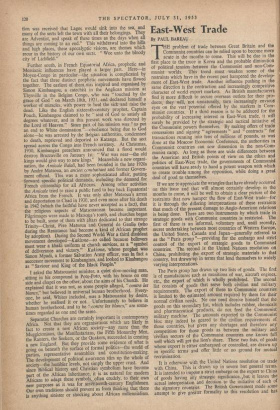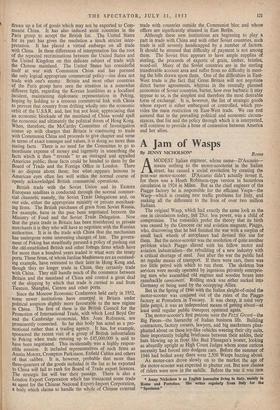East-West Trade
By PAULBAREAU THE problem of trade between Great Britain and the Communist countries can be relied upon to become more acate in the months to come. This will be due in the first place to the truce in Korea and the probable diminution of political tension between the Communist and non-Com- munist worlds. This trend must . weaken some of the restraints which have in the recent past hampered the develop- ment of East-West trade. Another influence pushing in the same direction is the contraction and increasingly competitive character of world export markets. As British manufacturers find it more difficult to secure overseas outlets for their pro. ducts, they will, not unnaturally, turn increasingly envious eyes on the vast potential offered by the markets in Com- munist countries. If a third reason is to be adduced for the probability of increasing interest in East-West trade, it will surely be provided by the strategic and tactical initiative of the Communist powers themselves. By making offers of trade concessions and signing " agreements ' and " contracts " for transactions running into tens of millions of pounds, as was done at the Moscow Economic Conference, the authorities in Communist countries can sow dissension in the non-Corn-, munist camp. As long as there are wide differences between the American and British points of view on the ethics and politics of East-West trade, the governments of Communist countries will have ready to hand a potent weapon with which to create trouble among the opposition, while doing a great deal of good to themselves.
If we are to appreciate the wrangles that have already occurred on this issue and that will almost certainly develop in the months to come, it will be well to obtain a clear picture of the restraints that now hamper the flow of East-West trade—for it is through the differing interpretations of these restraints that much of the present damage to Anglo-American relations is being done. There are two instruments by which trade in strategic goods with Communist countries is restricted. The first of these is an informal, voluntary and, until recently, secret undertaking between most countries of Western Europe, the United States, Canada and Japan—generally referred to as the "Paris group "—providing for the embargo and strict control of the export of strategic goods to Communist countries. The second is the United Nations resolution on China, prohibiting the export of strategic materials to that country, but drawn: up in terms that lend themselves to widely varying interpretations.
The Paris group has drawn up two lists of goods. The first is of manufactures such as munitions of war, aircraft engines, etc., the export of which is wholly prohibited. The second list consists of goods that serve both civilian and military requirements. The export of these to Communist countries is limited to the estimated amount required by them for their normal civilian needs. No one need deceive himself that the goods on this secondary list, which includes rubber, chemicals and pharmaceutical products, do not feed the Communist military machine. The amounts exported to the Communist bloc may indeed be geared to the civilian requirements of those countries, but given any shortages and therefore any competition for those goods as between the military and civilian sectors of the Communist countries one knows full well which will get the lion's share. These two lists, of goods whose export is either embargoed or controlled, are drawn up in specific terms and offer little or no ground for mutual recrimination.
It is otherwise with the United Nations resolution on trade with China. This is drawn up in severe but general terms. It is intended to impose a strict embargo on the export to China of goods having any strategic significance, ,but it leaves the actual interpretation and decision to the initiative of each of the signatory countries. The British Government made some attempt to give greater formality to this resolution and has drawn up a list of goods which may not be exported to Com- munist China. It has also induced most countries in the Paris group to accept the British list. The United States for its part has given the resolution a much stricter inter- pretation. It has placed a virtual embargo on all trade with China. In these differences of interpretation lies the root of the repeated recriminations between the United States and the United Kingdom on this delicate subject of trade with the Chinese mainland. The United States has considered itself at war with Communist China and has pursued the only logical appropriate commercial policy—One does not trade with one's enemy. Britain and most other countries of the Paris group have seen the situation in a somewhat different light, regarding the Korean hostilities as a localised incident, maintaining diplomatic representation in Peking, hoping by holding to a tenuous commercial link with China to prevent that country from drifting wholly into the economic orbit of the U.S.S.R. and, last but not least, appreciating that an economic blockade of the mainland of China would spell the economic and ultimately the political doom of Hong Kong. When, therefore, the McCarthy Committee of Investigation comes up with charges that Britain is continuing to trade with Communist China and proceeds to give chapter and verse in terms of exact tonnages and values, it is doing no more than stating facts. There is no need for the Committee to go to inordinate expense of money and ingenuity in unearthing the facts which it then " reveals " to an outraged and appalled American public; those facts could be handed to them by the Board of Trade and the Foreign Office in London. There is no dispute about them; but what 'appears heinous in American eyes often lies well within the normal course of openly acknowledged British commercial operations.
British trade with the Soviet Union and its Eastern European satellites is conducted through the normal commer- cial channels, namely, the Soviet Trade Delegations and, on our side, either the appropriate ministry or private merChant- ing firms. The British purchases of grain from Soviet Russia, for example, have in the past been negotiated between the Ministry of Food and the Soviet Trade Delegation. Now that the grain trade in Britain has been transferred to private merchants it is they who will have to negotiate with the Russian authorities. It is in the trade with China that the mechanism has undergone some interesting changes of late. The govern- ment of Peking has steadfastly pursued a policy of pushing out the old-established British and other foreign firms which have for more than a hundred years traded in what were the treaty ports. These firms, of whom Jardine Mathiesson are an outstand- ing example, have retreated to their lairs in Hong Kong and, though they no longer trade in China, they certainly trade With China. They still handle much of the commerce between Britain and the mainland of China and control a great deal of the shipping by which that trade is carried to and from Tientsin, Shanghai, Canton and other ports.
Since the Moscow Economic Conference held early in 1952, some newer institutions have emerged in Britain under political auspices slightly more favourable to the new regime in China. The first of these is the British Council for the Promotion of International Trade, with which Lord Boyd Orr and the Cambridge economist, Mrs. Joan Robinson, are prominently connected. So far this body has acted as a pro- motional rather than a trading agency. It has, for example, Sponsored the recent visit of a group of British industrialists to Peking when trade running up to £45,000,000 is said to have been negotiated. This incidentally was a highly respon- sible mission. It included representatives of such firms as Austin Motors, Crompton Parkinson, Enfield Cables and others of that calibre. It is, however, probable that more than three-quarters of the goods included in the list to be exported to China will fail to rank for Board of Trade export licences. The strategic list will bar their passage. There is also a London Export Corporation which has transacted some trade as agent for the Chinese National Export-Import Corporation, a body which claims to handle the whole of Chinese external trade with countries outside the, Communist bloc and whose offices are significantly situated in East Berlin.
Although these new institutions are beginning to play a part in trade with China and with other Soviet countries, such trade is still severely handicapped by a number of factors. It should be stressed that difficulty of payment is not among them. The Soviet bloc appears to have ample supplies of sterling, the proceeds of exports of grain, timber, bristles, wood-oil. Many of the Soviet countries are in the sterling transferable account area and suffer from no difficulty in meet- ing the bills drawn upon them. One of the difficulties in East- West trade is the fact that Great Britain will not negotiate• direct barter agreements, whereas in the centrally planned economies of Soviet countries, barter, how ever barbaric it may appear to us, is the simplest and therefore the most desirable form of exchange. It is, however, the list of strategic goods whose export is either embargoed or controlled, which pro- vides the main restriction on East-West trade. We can rest assured that in the prevailing political and economic circum- stances, that list and the policy through which it is interpreted, will continue to provide a bone of contention between America and her allies.



































 Previous page
Previous page